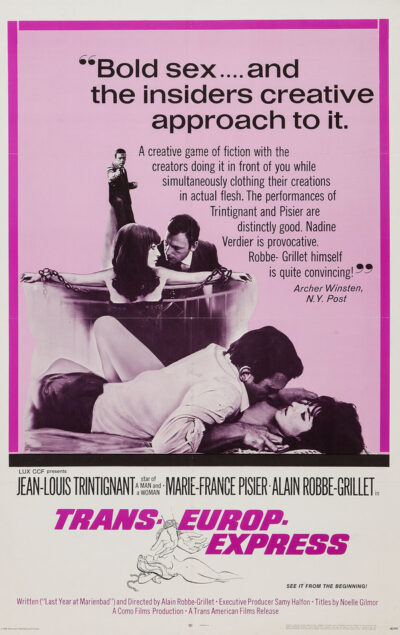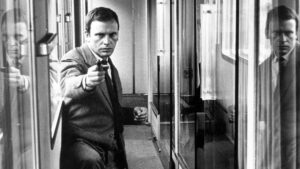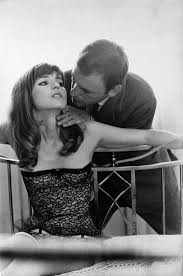 The second feature directed by the late novelist-filmmaker Alain-Robbe Grillet (1922-2008) was this 1967 lark that took the Euro crime thriller model for quite a ride. Grillet is best known in the US for scripting Alain Resnais’ French New Wave classic LAST YEAR AT MARIENBAD/L’année dernière à Marienbad (1961), but TRANS-EUROP-EXPRESS, which is marked by outrageous narrative convolutions and uncontained sexual fetishism (an element not present in MARIENBAD) is a much better representation of his style and outlook.
The second feature directed by the late novelist-filmmaker Alain-Robbe Grillet (1922-2008) was this 1967 lark that took the Euro crime thriller model for quite a ride. Grillet is best known in the US for scripting Alain Resnais’ French New Wave classic LAST YEAR AT MARIENBAD/L’année dernière à Marienbad (1961), but TRANS-EUROP-EXPRESS, which is marked by outrageous narrative convolutions and uncontained sexual fetishism (an element not present in MARIENBAD) is a much better representation of his style and outlook.
One day aboard the Trans-Europ-Express (this was allegedly the first film ever shot on an actual train) a film director (Grillet) plots out a crime thriller with a producer (Jérôme Lindon) and script supervisor (Catherine Robbe-Grillet). The prospective film, set to star Jean-Louis Trintignant, is conceived as “Something exciting with fights, violence, rape, you know…”
The story, which we see dramatized, involves Elias (Trintignant), a low level drug pusher tasked with transporting a suitcase full of cocaine between Paris and Antwerp, and doing so on the Trans-Europ-Express. Along the way he gets involved with several drug traffickers, who continually subject Elias to various tests designed to prove his loyalty, and a pesky police inspector (Henri Lambert) who insists on shadowing his every move.
Early on in his odyssey Elias stops off to buy a porno mag filled with bondage pics, indicating he (like Grillet) has a debilitating B&D fetish. Enter Eva (Marie-France Pisier), a prostitute he chains up and beats in a hotel room, which turns out to have a most disruptive effect on his profession.
Further disruption comes from Grillet as he fleshes out his story, making constant changes and additions. The film is always cutting back to Grillet and his companions in the “real” world, although the reality-fiction motif is muddied considerably by the fact that Grillet runs into his fictional creations on more than one occasion. Also present is a sense of playful comedy that at times is actually funny (as in a scene where a shadowy man instructs the protagonist to change hotels “for the sake of changing,” and then, after giving Elias an address, orders him to “repeat where.” Elias’ answer: “Where”).
To understand precisely what Grillet was trying to pull off with this nutty mishmash of reality, artifice, parody and eroticism, take a look at the French New Wave classics SHOOT THE PIANO PLAYER/ Tirez sur le pianiste (1960) by Francois Truffaut and BAND OF OUTSIDERS/Band a part (1964) by Jean-Luc Godard, which like TRANS-EUROP-EXPRESS wreaked plenty of postmodern havoc on traditional thriller narratives. This isn’t to say that this or any of Grillet’s films were actually part of the New Wave, as their obsessive eroticism places them in exploitation territory (a format derided by the New Wavers), and also the fact that, frankly, Grillet’s filmmaking simply didn’t measure up to that of Truffaut or Godard, who were adept at alternating not merely filmic artifice but tone.
Mind you, TRANS-EUROP-EXPRESS isn’t poorly made. It can, in fact, be proclaimed Grillet’s finest work as a director, with a focus and precision not present in his later films (in which he let his sexual proclivities run wild). The black and white visuals of cinematographer Willy Kurant (MASCULINE-FEMININE) are crisp and evocative (suggesting that Grillet should have stuck to black and white in his later, full color cinematic endeavors), resulting in an example of cinematic gamesmanship that if viewed in the right spirit (i.e. not taken too seriously) adds up to a terrifically enjoyable experience.
Vital Statistics
TRANS-EUROP-EXPRESS
Lux Campagne Cinematographique de France/Como Films
Director/Screenwriter: Alain Robbe-Grillet
Producer:
Cinematography: Willy Kurant
Editing: Bob Wade
Cast: Jean-Louis Trintignant, Marie-France Pisier, Christian Barbier, Raoul Guylad, Henri Lambert, Paul Louyet, Charles Millot, Rezy Norbert, Gerard Palaprat, Catherine Robbe-Grillet, Salkin, Ariane Sapriel, Prima Symphony, Clo Vanesco, Nadine Verdier, Virginie Vignon, Daniel Emilfork, Jérôme Lindon, Catherine Robbe-Grillet


